About this course
Aimed at Early Career Teachers, LJMU's Education Practice MA is linked to the ECT year and early professional development needs.
- Benefit from a programme specifically designed to support ECTs/RQTs
- Meet your early professional development needs
- Enjoy flexible delivery, support and fit studying around your work commitments
- Enhance your career prospects as a teacher
Having completed your postgraduate initial teacher training programme, you can enhance your teaching practice with this LJMU Masters course, as you embark on your career in education.
This programme is designed to support ECTs/RQTs and focuses on practice-based learning. Your learning development will be aligned with both your professional setting and individual needs and assessment will involve engagement in practice-based research projects.
Are you an Early Career Teacher (ECT) from an undergraduate degree? You would be able to apply for our MA Education and Social Justice degree as the MA Education Practice programme is designed for ECTs from postgraduate degree programmes.
If you're an established practitioner, you may be interested in our MA Education and Social Justice or EdD Education programmes.
When it comes to Continuing Professional Development for educationalists, we have over 30 years' experience. Course tutors offer a wide range of expertise and contribute to the development of national initiatives and policy in curriculum development, school leadership and governance, and initial teacher education.
Successful completion of this programme will give you enhanced knowledge and understanding of the theory and practice around current research-based initiatives in teaching and learning and the ability to critically assess their impact on learners.
Course modules
Discover the building blocks of your programme
Further guidance on modules
Modules are designated core or optional in accordance with professional body requirements, as applicable, and LJMU’s Academic Framework Regulations. Whilst you are required to study core modules, optional modules provide you with an element of choice. Their availability may vary and will be subject to meeting minimum student numbers.
Where changes to modules are necessary these will be communicated as appropriate.
Core modules
Professional Practice for Beginning Teachers
20 credits
20 credits
This module will enable you to evidence your development as a professional through investigation of your school and professional practice, allowing you to reflect on a range of issues that relate theory and practice. It aims to:
- enable you to employ a range of techniques for reflection and analysis
- critically review and evaluate your own school-based practice in relation to current research and learning, teaching and assessment and other professional issues in teaching
- enable you to use reflective practice in meeting your professional development needs as a newly qualified teacher
Pedagogy in Practice
20 credits
20 credits
This module is designed to support newly or recently qualified teachers in the critical reflection of planning and delivering learning sequences. It will enable you to:
- evidence how theory on planning, as well as subject specific perspectives, interact with its application in your classroom, allowing you to reflect on a range of issues that relate theory and practice
- examine and understand better the process of planning for learning and its inter-dependency on subject knowledge issues and learner needs
- explore the relationship between theory and practice of planning for continuity, progression and learning impact in the classroom
Inclusion
20 credits
20 credits
This module is designed to support newly or recently qualified teachers in their early professional development. It aims to:
- equip you with an understanding of the range of children's educational needs
- enable you to appreciate the interplay between theory and practice in relation to different educational needs informing practice within the classroom
- enable you to recognise and respond to the diversity of learners
Professional Inquiry
60 credits
60 credits
This module is the generic Masters element of the MA programme and is a core activity. It provides an opportunity to carry out research projects of relevance to your professional practice and professional development needs, largely independently but with regular individual support from an assigned Supervisor. It enables you to:
- develop a research proposal to investigate an identified area of interest
- complete relevant research-based investigation of a defined area that has relevance to your professional practice
Subject Pedagogy
20 credits
20 credits
The module uses a critical perspective to develop understanding of learning and teaching within an identified subject area in the primary or secondary sector. It will enable you to:
- practice and critically analyse and evaluate different strategies and approaches to learning, teaching and assessment in your subject area
- have a critical understanding of the subject area in schools, colleges and settings
- analyse how the subject area is taught in the primary or secondary sectors
- investigate the development of learner understanding and barriers to learning the subject
- critically evaluate strategies which promote learning in the subject area
Researching Classroom Practice
20 credits
20 credits
This module will introduce you to the ideas and analytical possibilities of critical research and the application of a range of theoretical positions to the critical analysis of key research and policy issues in education. It will enable you to:
- practice, critically analyse and evaluate different strategies and approaches to learning, teaching and assessment in the primary core curriculum areas related to theoretical input
- develop an understanding of effective learning, teaching and assessment strategies which cater for the needs, within the secondary curriculum subject areas, of diverse learners
- develop a systematic knowledge and understanding of approaches to practitioner research related to education settings
- critically evaluate and reflect on the appropriateness and effectiveness of specified learning, teaching and assessment activities
Developing Reflective Professional Practice
20 credits
20 credits
This module will introduce you to the concepts of reflection on professional practice and aspects of current policy and research relating to learning, teaching and assessment and professional issues in primary and secondary contexts. It will enable you to:
- systematically develop and demonstrate and critically reflect on evidence of competence in all national standards relating to qualified teacher status
- employ a range of techniques for reflection and analysis to critically review and evaluate your own school-based practice in relation to current research on LTA and professional issues in teaching
Your Learning Experience
An insight into teaching on your course
Study hours
All students are part-time. The programme is delivered via Canvas, arranged tutorials and three taught days during the academic year. These are on Saturdays in October, January and April.
For PGDE entrants, there is one module, 7304EP Professional Inquiry, involving formative tasks and two assessed practitioner research projects. PGCE entrants will also complete three first year modules: 7301EP Professional Practice, 7302EP Pedagogy in Practice and 7303EP Inclusion. Each module involves formative tasks and an assessed professional project.
Teaching methods
Tutorial support is an important part of the development process and you will receive a personalised service that will enable you to set targets and achieve to your highest potential.
Personal Tutors and other members of the academic team are accessible at scheduled times during the programme and will also be able to provide guidance via email as appropriate.
You will have access to LJMU learning resources including our libraries and online learning services for independent study.
Applied learning
The practical applications of the course may involve integration of study with your professional activity in school or college.
As a practice-based programme there is a strong emphasis on the application of ideas developed in the context of your own classroom, school or setting.
How learning is monitored on your programme
To cater for the wide-ranging content of our courses and the varied learning preferences of our students, we offer a range of assessment methods on each programme.
Where you will study
What you can expect from your School
Based in the Education Building in the heart of the Mount Pleasant campus, the School of Education features a wide range of cutting-edge facilities, including a pedagogy room, lecture rooms, computing facilities and a nearby Outdoor Learning Zone for our Natural Curriculum projects. Students also benefit from independent study spaces, a close-by cafeteria and library, and access to student welfare and support.
Course tutors

Dr Mike Martin
- Programme Leader
We are delighted to provide a programme that enables newly qualified teachers to gain the recognition of a full MA award through an innovative programme tailored to meeting their early professional development needs.
We are delighted to provide a programme that enables newly qualified teachers to gain the recognition of a full MA award through an innovative programme tailored to meeting their early professional development needs.
Mike has been involved in Design and Technology education for 25 years as teacher, co-ordinator, education officer and now teacher educator. He has worked in 3 other ITE institutions developing and delivering primary and secondary courses and is probably best known for his work on values in design and technology. He has continued to write papers and presents regularly at national and international conferences. Since joining LJMU in 2004, he has been PGCE Route Leader for Design and Technology, co-ordinated the PGCE course, been responsible for an undergraduate KS2/3 design and technology course and is now heavily involved in teaching research methods.Mike has now completed his doctoral research which explores the subject knowledge development of pre-service teachers of Design and Technology in secondary schools. This makes use of a phenomenological approach, reflecting his interest in both philosophy and psychology.
Career paths
Further your career prospects
LJMU has an excellent employability record with 96% (HESA 2018) of our postgraduates in work or further study six months after graduation. Our applied learning techniques and strong industry connections ensure our students are fully prepared for the workplace on graduation and understand how to apply their knowledge in a real world context.
The course is intended for those working in educational settings and, on graduation, you may progress to research-based study through engaging with our MPhil and PhD programmes in education.
Many of our students will go on to achieve their career goals by securing leadership and other posts of responsibility in schools and colleges.
Fees and funding
Tuition Fees:
- Home part-time per year:
- £4,195
Fees
The fees quoted at the top of this page cover registration, tuition, supervision, assessment and examinations as well as:
- library membership with access to printed, multimedia and digital resources
- access to programme-appropriate software
- library and student IT support
- free on-campus wifi via eduroam
Additional costs
Although not all of the following are compulsory/relevant, you should keep in mind the costs of:
- accommodation and living expenditure
- books (should you wish to have your own copies)
- printing, photocopying and stationery
- PC/laptop (should you prefer to purchase your own for independent study and online learning activities)
- mobile phone/tablet (to access online services)
- field trips (travel and activity costs)
- placements (travel expenses and living costs)
- student visas (international students only)
- study abroad opportunities (travel costs, accommodation, visas and immunisations)
- academic conferences (travel costs)
- professional-body membership
- graduation (gown hire etc)
Funding
There are many ways to fund postgraduate study for home and international students. From loans to International Scholarships and subject-specific funding, you’ll find all of the information you need on our specialist postgraduate funding pages.
Please be aware that the UK’s departure from the EU may affect your tuition fees. Learn more about your fee status and which tuition fees are relevant to you.
Entry requirements
You will need:
Qualification requirements
Postgraduate degree (required for research programmes)
- to have completed an initial teacher training programme at postgraduate level and have achieved Qualified Teacher Status
Further information
-
Extra Requirements
- to be employed as a teacher during your period of study
-
RPL
- RPL is accepted on this programme
International requirements
IELTS
- IELTS score 6.0 (minimum 5.5 in each component)
How to apply
Securing your place at LJMU
To apply for this programme, you are required to complete an LJMU online application form. You will need to provide details of previous qualifications and a personal statement outlining why you wish to study this programme.
Your university life
From accommodation and academic support to clubs and societies. Find out what LJMU has to offer.
Talk to our students
Connect with a current LJMU student for advice and guidance on university life, courses and more.
See what our students are saying
At LJMU we want you to know you’re making the right choice by studying with us. You can see what our students are saying about their experience with us through their reviews on the following websites:
Related Links
News and views
Browse through the latest news and stories from the university
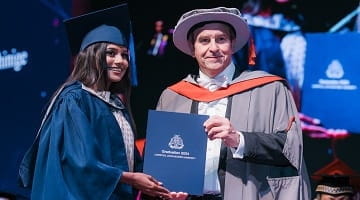
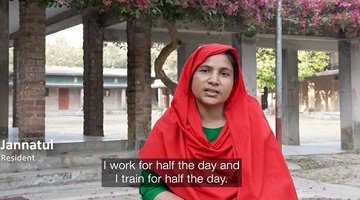
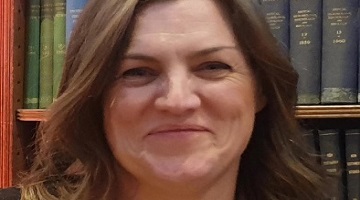
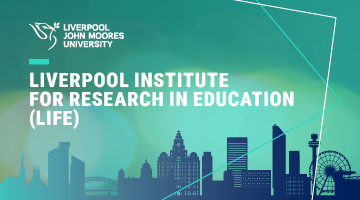
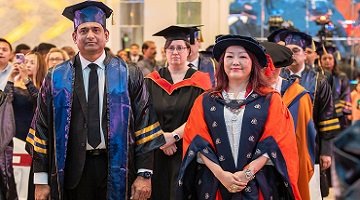

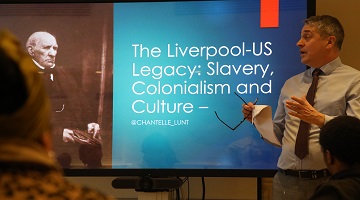
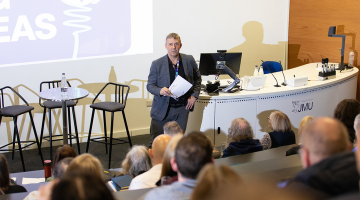

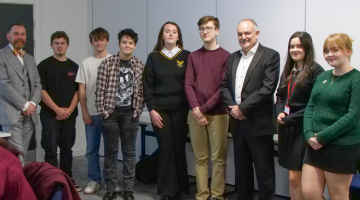
The University reserves the right to withdraw or make alterations to a course and facilities if necessary; this may be because such changes are deemed to be beneficial to students, are minor in nature and unlikely to impact negatively upon students or become necessary due to circumstances beyond the control of the University. Where this does happen, the University operates a policy of consultation, advice and support to all enrolled students affected by the proposed change to their course or module.










